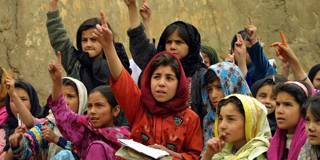With over 70% of the Afghan population under 25 years of age, educating today’s young people means creating a generation of skilled workers, potentially effective leaders, and engaged citizens. That is a formula for political stability and sustained economic development.
NEW YORK – US President Joe Biden has decided that it is time for American troops finally to leave Afghanistan, the first country to which the United States sent troops after the September 11, 2001, terror attacks. He set a fitting withdrawal deadline – the 20th anniversary of those attacks – but America’s remaining troops have left the country much sooner, with only 600 remaining in early July, along with other NATO forces and thousands of private contractors.
Biden’s timetable has elicited cheers from those who are eager to end the “forever wars.” But it has also drawn criticism from those who predict the collapse of the Afghan government, a takeover by the Taliban, and renewed al-Qaeda activity. Already, violence is on the rise, and progress in areas like women’s rights, hygiene, and health is at risk of being reversed. Yet there are ways to mitigate such risks that have little to do with the military.
As it stands, the military dimension of America’s Afghan policy seems to be the one getting all the attention. “Ending US involvement in an endless war doesn’t end the endless war,” warned General David Petraeus, a former commander of the US Central Command and CIA director. “It just ends our involvement. And I fear that this war is going to get worse.” Petraeus also noted that the US is losing a valuable platform for regional counterterrorism campaigns, concluding that America would come to regret the decision to withdraw.

NEW YORK – US President Joe Biden has decided that it is time for American troops finally to leave Afghanistan, the first country to which the United States sent troops after the September 11, 2001, terror attacks. He set a fitting withdrawal deadline – the 20th anniversary of those attacks – but America’s remaining troops have left the country much sooner, with only 600 remaining in early July, along with other NATO forces and thousands of private contractors.
Biden’s timetable has elicited cheers from those who are eager to end the “forever wars.” But it has also drawn criticism from those who predict the collapse of the Afghan government, a takeover by the Taliban, and renewed al-Qaeda activity. Already, violence is on the rise, and progress in areas like women’s rights, hygiene, and health is at risk of being reversed. Yet there are ways to mitigate such risks that have little to do with the military.
As it stands, the military dimension of America’s Afghan policy seems to be the one getting all the attention. “Ending US involvement in an endless war doesn’t end the endless war,” warned General David Petraeus, a former commander of the US Central Command and CIA director. “It just ends our involvement. And I fear that this war is going to get worse.” Petraeus also noted that the US is losing a valuable platform for regional counterterrorism campaigns, concluding that America would come to regret the decision to withdraw.